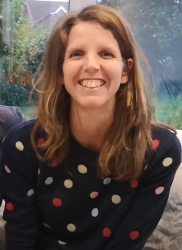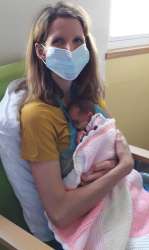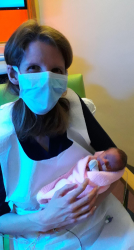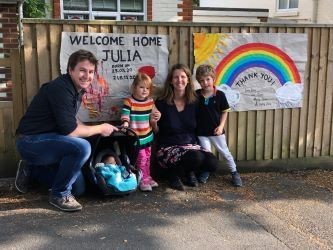AIMS Journal, 2021, Vol 33, No 4
To read or download this Journal in a magazine format on ISSUU, please click here.

By Liz Thomas
Last week, as I watched my baby daughter taking her first steps, I thought about what a strong and determined kid she has become, and how her reaching this milestone is really something of a miracle given that for a long time we weren’t sure whether she’d be with us at all.
In September 2019 Owen, my husband, and I found out we were expecting our third child. We’d recently moved house and – both of us teachers – had found new jobs in the area. We were looking forward to this chaotic but exciting new chapter of our lives, with a new baby sibling on the way for our son Matthew, four, and daughter Anna, two.
In the December that followed, our lives changed dramatically. I was at work teaching French to a class of year 7 students, when I suddenly started bleeding. I was taken to hospital just 17 weeks into my pregnancy. Blood clots had formed in my womb and I continued to bleed for several weeks. At 20 weeks we had a scare when it was thought I could be in early labour and was taken to the labour ward in Southampton hospital. Luckily, this was not the case; I could leave hospital, but the doctors had advised bed rest to protect the baby. We realised that we would need to temporarily move in with my parents, as I would be unable to care for my other children. However, at 30 weeks pregnant, and as the very real threat of the coronavirus pandemic became apparent, staying at my parents’ home was no longer an option. We needed to move back home to protect my parents from contracting Covid-19.
To get to 31 weeks of pregnancy felt like an achievement as we had already experienced a rollercoaster of emotion not knowing if the baby would survive. She was born on 23 March 2020 – nine weeks early – weighing just 2lb 15oz. It was the same day that the prime minister announced Britain would be going into national lockdown and the same day that the neonatal ward had to close its doors to more than one parent. After the birth, the superb team of staff quickly checked she was breathing and for vital signs and then allowed Owen and I to have a brief cuddle with her before she was taken away in an incubator to the neonatal ward.

I was initially mostly just overjoyed that she had made it, which at the time overrode any fear of Covid-19, and Owen and I were in complete agreement that it was the right decision to keep NHS staff, babies and parents as safe as possible. However, the impact of the pandemic soon became apparent. Our tiny baby had to stay in hospital and only I could enter the building to see her and then, I could only hold her when wearing full PPE. Even deciding on a name was hard without Owen even having seen his daughter since the birth, but after three weeks, we chose Julia.

Owen, in particular, was experiencing stress as he adapted to remote teaching for work whilst trying to take care of our now five- and three-year-olds. We had to effectively split our responsibilities for looking after our family. Every day, I’d have to drive the 1½ hr round trip to Southampton hospital, then put on apron and mask so I could see Julia and express milk to syringe-feed her. After the stresses of the pregnancy, this was exhausting, and so once or twice a week Owen would drive all four of us to the hospital. He would have to wait for up to five hours outside in the car park, keeping our other two children entertained whilst I was inside with Julia. I remember one time looking down over the almost empty car park and seeing my son on his bike. One of the staff kindly held baby Julia up to the window so that Owen could see her. This was his first glimpse of his baby daughter since her birth, which was a surreal but significant moment.
Things became more difficult when Julia began to have various complications, most of which were things that we had never imagined. In particular, I remember a phone conversation with the excellent endocrine doctor who told us that, amongst other complications, she may not have any ovaries. This would have usually been a face-to-face conversation and was very hard to process whilst listening on a speakerphone in the kitchen with our other two children in the next room.
We had complete trust in the NHS staff but the conditions imposed by the pandemic made it very hard for Owen to connect with Julia in those early weeks. vCreate, an NHS-trusted video messaging service for sharing pictures securely, helped a little, but of course was nothing compared to real human contact and I think he felt he missed out on having time with her at the start.
After nearly six weeks in hospital, Julia came home and our family could finally be together for the first time. Once she was home, I found the round-the-clock care needed for a premature baby to be extremely intense, especially as Julia wasn't gaining weight or breastfeeding well. The main difficulty caused by Covid-19 was that we couldn't have any help from friends and family with looking after the other two children despite them living close by. But I was also grateful to have Owen working at home because I don't think I could have coped without him. The NHS home team were also very supportive and helped us through a very difficult time. Friends were kind but people were naturally focused on the pandemic, and so we were so grateful for the NHS staff who understood what we were going through and made time for us.
Julia has had a very challenging start to life and for a long time I was taking her to nearly weekly appointments at the hospital for physio, though the necessary restrictions meant that Owen wasn't able to attend any of these. We also needed to take Julia to A&E a few times – once after staff discovered haemangiomas[1] on her liver which I remember reading about as a condition that could possibly lead to heart failure. This was very hard to process. It seemed that as one issue was sorted, another would appear and all at a time when Covid restricted our ability to be in those difficult moments together and seek support from family.
By Christmas 2020, when Julia was nine months old, Owen said he felt he'd been able to bond with her a bit more, and to see her smiling and growing is so wonderful after everything that's happened. As parents we have had to become more resilient and looking back we can see how far we have come.
Looking at Julia now, she is a bright and joyful little girl and seemingly fearless of the world she’s growing into. In the 18 months since she was born we’ve overcome so much as a family. The challenges of Covid continue to come and go but I feel that since last year our sense of reality has changed and I'm not surprised by things when they happen any more. And I must say that we will forever feel hugely grateful to the NHS staff for all they have done and continue to do for Julia and we will always count our blessings.[2]

[1] Editor’s note: Hemangiomas are benign (noncancerous) growths made up of blood vessels.
[2] Editor’s note: Unlike in the early days of the pandemic when Julia was born, most neonatal units now allow both parents to visit together, for all or a large part of the day. This AIMS information page may help keep you up-to-date - Coronavirus and your maternity care
The AIMS Journal spearheads discussions about change and development in the maternity services..
AIMS Journal articles on the website go back to 1960, offering an important historical record of maternity issues over the past 60 years. Please check the date of the article because the situation that it discusses may have changed since it was published. We are also very aware that the language used in many articles may not be the language that AIMS would use today.
To contact the editors, please email: journal@aims.org.uk
We make the AIMS Journal freely available so that as many people as possible can benefit from the articles. If you found this article interesting please consider supporting us by becoming an AIMS member or making a donation. We are a small charity that accepts no commercial sponsorship, in order to preserve our reputation for providing impartial, evidence-based information.
AIMS supports all maternity service users to navigate the system as it exists, and campaigns for a system which truly meets the needs of all.